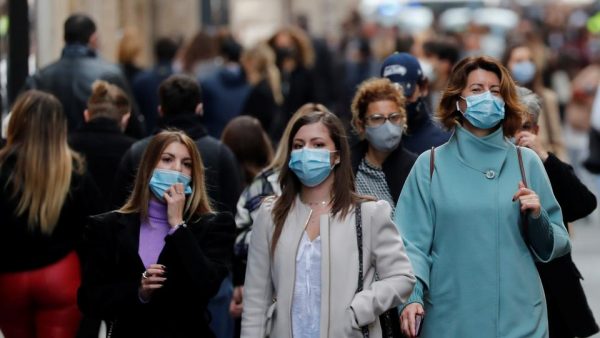Cases of the new Omicron variant in the UK have risen by more than 50 per cent in one day.
On Sunday, 86 cases of the new variant were recorded, bringing the UK’s total to 246.
Sixty-eight of these were discovered in England, and the other 18 in Scotland, where there are now 48 confirmed cases in total, the UK Health Security Agency (UKHSA) has said.
A rise in the prevalence of COVID-19 infections in England in the latest week was driven by the dominant Delta variant rather than Omicron, Britain’s Office for National Statistics (ONS) said on Friday.
There have been 134 confirmed cases of the Omicron variant in Britain, which has mutations consistent with reduced vaccine efficacy.
The prevalence of COVID-19 infections in England rose to around 1 in 60 people in the week ending Nov. 27 from 1 in 65 reported the previous week, the ONS said, adding that 99% of all sequenced cases were Delta.
“To date, we have not identified any infections compatible with the new Omicron variant (B.1.1.529) among our survey participants,” the ONS said.
However, the UK Health Security Agency (UKHSA) said that in the week since, there had been a rise in the proportion of tests displaying a distinctive mutation that distinguishes Omicron from Delta but can appear in other variants.
“This is still a very small number of cases but is being investigated carefully to understand whether it is related to travel, any other variant or whether there is evidence of spread of Omicron beginning in the community,” UKHSA said.
The World Health Organization’s chief scientist, Soumya Swaminathan, told the Reuters Next conference that Omicron might displace Delta as the dominant variant globally but that it was impossible to predict.
But it is the spread of the dominant and highly transmissible Delta variant, especially among children, that is keeping infection levels high for now.
On Thursday, Britain reported its highest daily infection number since July, and the ONS said infections were highest in children.
Ravi Gupta, Professor of Clinical Microbiology, University of Cambridge, said that it was not a given that Omicron would entirely displace Delta, which might continue to circulate in unvaccinated populations like young children.
“More Delta circulating in kids and then more Omicron circulating proportionately in vaccinated individuals is one scenario that could play out… it will be hard to displace Delta completely,” he told Reuters.
“Omicron is not spreading rapidly at the moment, by the look of it… there is probably sustained community transmission, but it’s probably just starting.”
On Saturday, a change to travel rules was announced in a bid to slow the spread of the new variant.
Nigeria was added to the travel red list, which will go into effect from 4am Monday, 6 December.
On Saturday evening, Mr Javid tweeted: “From 4am Monday, only UK and Irish citizens and residents travelling from Nigeria will be allowed entry and must isolate in a managed quarantine facility.”
From 4am Tuesday, all people travelling to the UK from the country will have to take a pre-departure test, regardless of vaccination status, he added.
Earlier this week, people were ordered to wear masks in shops and on public transport and 10-day isolation periods were reintroduced for people in contact with the new variant, regardless of their vaccination status.
However, a government scientific advisor today said it is “too late” to make a “material difference” to a potential wave of omicron cases.
He said: “If omicron is here in the UK, and it certainly is, if there’s community transmission in the UK, and it certainly looks that way, then it’s that community transmission that will drive a next wave … but I think it’s too late to make a material difference to the course of the omicron wave if we’re going to have one.”
Dr Katherine Henderson, the president of the Royal College of Emergency Medicine, also warned that the NHS will be in a “very, very difficult position” if the Omicron variant causes a surge in hospital admissions.
She said that the situation is already “spectacularly bad” and likely to become worse
She added: “We will always still be there. We still want patients to come but we do have to help people to understand that really at the moment the service is so stretched that an extra push could be very very difficult.”




